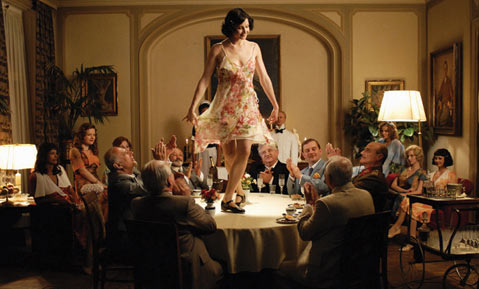I Served the King of England
Ivan Barney and Oldrich Kaiser star in a film written and directed by Jir- Menzel, based upon the novel by Bohumil Hrabal.

In 1966, Czech director Jir- Menzel cooked up a fascinating blend of folkloric storytelling, Nazi-era angst, and gentle eroticism in Closely Watched Trains, which has taken its place amongst the must-see films of Eastern European origin. Those same elements appear again, 40 years later, in more elaborate and would-be epic form in I Serve the King of England, one of the most oddly charming and darkly enchanted foreign films to hit these shores recently.
For one, the film, adapted by Menzel from Bohumil Hrabal’s novel, is a model of narrative poise and cunning. Menzel takes on layers of meaning and a sweep of history in his version, but wisely approaches his deeper subjects-particularly the tyranny of hierarchy and the cruelties of political fate imposed on Czechoslovakia in the 1900s-through the prism of deceptive simplicity. Menzel starts his tale from forward to back as a man released from prison recounts his meandering past, and from the ground up, as protagonist Jan D®te is played by Ivan Barney and Oldrich Kaiser in younger and older guises.
A waiter with visions of becoming a millionaire, Jan is a doe-eyed witness to the 20th century. He blandly observes the machinations of the world through his places of employment and the casual decadence of the rich industrialists who patronize the swanky Hotel Paris. Along the way, Jan also learns of sex and its allure through prostitutes who blithely dance and glide through the story. As in Closely Watched Trains, Menzel deals with sex directly and without coyness nor lasciviousness.
Innocence keeps bumping into evil, arriving in the form of socio-economic inequities and then the more sinister arrival of the Nazis. Suddenly, it matters not that his coworker served the King of England or that Jan sneakily acquired a medal from the Emperor of Ethiopia. Rules of order have changed, and they will again when Soviet forces transform the face of Czech reality.
As if in sly self-reference, Menzel includes a recurring train scene in his latest film, in which Jan is found running after moving trains, first to give change to a customer on the run and later to give bread to concentration camp-bound Jewish detainees. Different trains, different moral conditions. History repeats and refers to itself, into the uncertain but familiar future.



